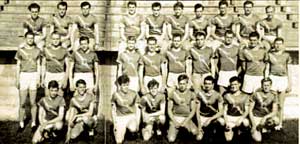Morgan Hill
– Longtime South Valley resident Harold
”
Hal
”
Davis, also known as the
”
California Comet
”
for setting track and field world records nearly 70 years ago
died of a blood clot in his brain.
Morgan Hill – Longtime South Valley resident Harold “Hal” Davis, also known as the “California Comet” for setting track and field world records nearly 70 years ago died of a blood clot in his brain.
Davis, born in Salinas Jan. 5, 1921 to Edgar and Pearl Davis, died Aug. 10 at Sutter Lakeside Hospital in Lakeport, Calif. He was 86.
Around 1939 Davis earned the moniker “the California Comet” while attending Live Oak High School as he set world records in the 100 yards (9.4 seconds), 100 meters (10.2 seconds), and 220 yards (21 seconds).
Davis still holds the 220-yards record in the Central Coast Section.
Davis rightfully held the title of “World’s Fastest Human” from 1940-43, winning seven Amateur Athletic Union (AAU) and four National Collegiate Athletic Association (NCAA) championships in the 100-meter and 200-meter sprints.
Davis’ grandson Aaron Bragg from Spokane, Wash. fondly remembers time spent with the man he considered a father.
“My best memories are the times he and I would sit on the front porch of my folks’ house in the summers when he’d visit,” Bragg said. “We’d talk for hours, tossing a Frisbee for the dog, drinking a beer or an iced tea. He could talk about anything because his interests were so varied and wide-ranging.”
In 1941, Davis tied Jesse Owens’ world 100-meter record of 10.2 seconds while a student at Salinas Junior College, now Hartnell Junior College, under Hall of Fame coach Bud Winter.
Owens participated in the 1936 Summer Olympics in Berlin, Germany where he achieved international fame by winning four gold medals.
He then transferred to the University of California, Berkeley where he was coached by another Hall of Famer Brutus Hamilton.
At UC-Berkeley, Davis won the national collegiate 100- and 220-yard titles in 1942 and 1943.
Overall, he won the AAU 100 title three times and was a four-time champion in the AAU 200 meters.
Davis reached his peak performance during the hard years of World War II when both the 1940 and 1944 Olympic games were canceled, never getting a chance to display his speed on the world stage.
His running career was then cut short by an injury in 1946, following service in the South Pacific as a Marine Corps mapmaker during WWII.
In the Marines Davis spent some time in China, and went into Japan shortly after Hiroshima and Nagasaki.
He was inducted in the national Track and Field Hall of Fame in the inaugural class of 1974, alongside Owens, Hamilton, and 23 others.
Davis was inducted into the University of California Hall of Fame in 1990.
He was also inducted into the San Jose Hall of Fame in 1998 along with famed 49ers and San Jose State coach Bill Walsh.
Davis met his wife, Betty Lou, on a shuttle bus between Salinas and Morgan Hill while attending Salinas Junior College.
Betty Lou Davis died in 1981 the day before Thanksgiving, and two days later, his mother died.
When Davis was inducted to the national Track and Field Hall of Fame Bragg, now 40, was only 7 years old.
“I told all my friends – not that my grandfather was inducted – but how he got to meet Jesse Owens,” Bragg said. “It didn’t really dawn on me until later how important a track figure he was. I don’t know how much of a relationship he had with Mr. Owens, but I do know that he was very close to his two college coaches, Bud Winter and Brutus Hamilton.”
A few years after the death of his wife, Betty Lou, Davis retired, sold everything, bought an RV, and traveled the country.
“The thing is, he really, really loved this country, and the more he saw of it, the more he loved it,” Bragg said. “He’d head up to Alaska, or spend a couple of months in the Four Corners area, or head east to visit friends in North Carolina.”
When half of the money he’d saved up for the trip was gone, he’d come back and stay with us for two or three months always arriving unannounced, Bragg said.
“Poppa was a cowboy, a jack-of-all-trades, a better than average square-dancer, a doting father, grandfather, and great-grandfather, an RV vagabond with a hat that read ‘This Is What Old Looks Like,’ ” Bragg said.
“Everything important I know, I learned from him … and I’m not talking about how to change a flat or fix a barbed-wire fence … I’m talking about life.
“He was like some sort of character out of a Louis L’Amour novel: tough, kind, savvy, and deceptively smart. And the gentlest, most self-effacing man you’d ever meet.”
Davis is survived by a brother, Stanley Davis, of Sparks, Nev.; a son, Gregory Davis, of Kelseyville, Calif.; a daughter, Donna Bragg, of Pomeroy, Wash.; four grandchildren and numerous great-grandchildren.
Services for Harold “Hal” Davis are pending.








